| |
  
I N - T H I S - I S S U E :
     


Index of
SEMJA reviews
|
|
Recent Recordings by Area Musicians
BY PIOTR MICHALOWSKI
Tenor
and soprano saxophonist Steve
Wood has been a prominent member of the Detroit scene for many
years, but he is not well represented on recordings. He has more than
made up for it with Deep Woods (CORD
SWCD 3342-2). The
sax man is joined by some of the finest players from Michigan: Paul Keller
on bass, 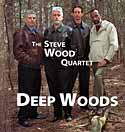 Phil
Kelly on piano, and Ron Jackson on bass. The tunes are mostly jazz standards,
with the exception of the one blues on the date, "ODPR
Blues," a very nice original by Wood, on which the leader shows his
fine sense of the form. Wood sticks to his main horn — the tenor
— except for the first track, "Invitation," which features his rich-toned
soprano. From the fast acrobatics of "Donna
Lee" to the quiet meditations on the Coltrane ballad "Central Park
West," Woods plays first class traditional modern tenor, running through
the changes with fluid confidence, without resorting to licks and clichés.
He pays homage to the tradition, but has a style that is definitely his
own. There is a warm sense of emotional involvement that permeates his
playing at all times. All of this is more than helped by his associates,
who react in style to his phrasing and provide strong rhythmic support.
Kelly's tasteful solos are an added delight. His talents are well displayed
on Kenny Barron's "Voyage," played as a sax and piano duet. Phil
Kelly on piano, and Ron Jackson on bass. The tunes are mostly jazz standards,
with the exception of the one blues on the date, "ODPR
Blues," a very nice original by Wood, on which the leader shows his
fine sense of the form. Wood sticks to his main horn — the tenor
— except for the first track, "Invitation," which features his rich-toned
soprano. From the fast acrobatics of "Donna
Lee" to the quiet meditations on the Coltrane ballad "Central Park
West," Woods plays first class traditional modern tenor, running through
the changes with fluid confidence, without resorting to licks and clichés.
He pays homage to the tradition, but has a style that is definitely his
own. There is a warm sense of emotional involvement that permeates his
playing at all times. All of this is more than helped by his associates,
who react in style to his phrasing and provide strong rhythmic support.
Kelly's tasteful solos are an added delight. His talents are well displayed
on Kenny Barron's "Voyage," played as a sax and piano duet.
Chris Collins teaches
jazz at Wayne State
and plays quite a bit in Detroit and surrounding areas. On his latest
CD [ Chris Collins Quartet, Urban Solitude (Harriet Jazz
HJ 002, 810-752-2935)
] he is joined by Dennis Tini on piano, Ray 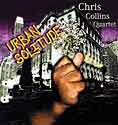 Parker
on bass, and David Taylor on drums. The leader penned all the of the tunes,
except for "Very
Early," written by pianist Bill Evans, but made famous among saxophonists
by Stan Getz. Collins is a hard driving tenor man with a bite to his sound,
who loves to vary his articulations for expressive purposes. Even when
he pays homage to Getz, he soon muscles in on the tone, and takes off
in his own directions. Drive and swing are the catchwords here and the
rhythm section is right there with him. Collins is a tenor virtuoso, who
loves to show his amazing command of the tenor. He also has an imaginative
sense of melody and harmony; his own compositions served as vehicles to
explore a variety of moods and tempos. He has a big, expressive sound
and likes to play with phrases as with a basketball, throwing them in
the air, or playing them backwards. His cohorts are right there with him
and provide imaginative solos of their own. Parker
on bass, and David Taylor on drums. The leader penned all the of the tunes,
except for "Very
Early," written by pianist Bill Evans, but made famous among saxophonists
by Stan Getz. Collins is a hard driving tenor man with a bite to his sound,
who loves to vary his articulations for expressive purposes. Even when
he pays homage to Getz, he soon muscles in on the tone, and takes off
in his own directions. Drive and swing are the catchwords here and the
rhythm section is right there with him. Collins is a tenor virtuoso, who
loves to show his amazing command of the tenor. He also has an imaginative
sense of melody and harmony; his own compositions served as vehicles to
explore a variety of moods and tempos. He has a big, expressive sound
and likes to play with phrases as with a basketball, throwing them in
the air, or playing them backwards. His cohorts are right there with him
and provide imaginative solos of their own.
Pianist Dennis Tini
comes to the fore on his own recording, Time Will Tell (Nicoletini
NTM 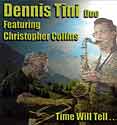 001,
248-476-1436), in duet with Collins. This time the compositions are by
the pianist, with a Brubeck standard and two Collins pieces added in.
There is a broad range of styles represented here, from very slow ballads
to burning swingers. Brubeck is represented not only by the opening "In
Your Own Sweet Way," but also by means of an only slightly disguised "All
the Things You Are," under the title "Bach's Things," which is really
a reflex of the way the famous pianist used to play the Kern piece. The
whole disc is a fine example of musical empathy; two highly accomplished
musicians who know each other well work in tandem but also do their best
to provide some surprises along the way. 001,
248-476-1436), in duet with Collins. This time the compositions are by
the pianist, with a Brubeck standard and two Collins pieces added in.
There is a broad range of styles represented here, from very slow ballads
to burning swingers. Brubeck is represented not only by the opening "In
Your Own Sweet Way," but also by means of an only slightly disguised "All
the Things You Are," under the title "Bach's Things," which is really
a reflex of the way the famous pianist used to play the Kern piece. The
whole disc is a fine example of musical empathy; two highly accomplished
musicians who know each other well work in tandem but also do their best
to provide some surprises along the way.
The late Bill Dowdy
was for many years a mainstay of the Battle Creek jazz scene, playing
with local and visiting musicians, teaching in university jazz programs,
and running a well-known substance-abuse prevention program in the 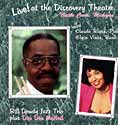 community.
He was best known, however, for the years he spent on the road with The
Three Sounds. He made many recordings with the famous trio, but has not
been well represented on recordings since then. His last recording put
out to date is Bill Dowdy Jazz Trio plus Dee Dee McNeil, Live! at
the Discovery Theatre (Deee Square Records). The CD captures a
hometown concert during which Claude Black joined the drummer on piano,
and Elgin Vines on bass, and, on most numbers, by singer Dee Dee McNeil.
The trio pieces are relaxed and swinging, somewhat reminiscent of the
style of Dowdy's best known trio, but pianist Black has his own style
of bluesy bop that differs from the funky stylings of Gene Harris, who
played in the Three Sounds. When McNeil joins the trio, the heat comes
up a notch, as she likes to dig into songs and gets sassy fairly soon.
All four musicians love to swing and at this concert they were at the
top of their game. community.
He was best known, however, for the years he spent on the road with The
Three Sounds. He made many recordings with the famous trio, but has not
been well represented on recordings since then. His last recording put
out to date is Bill Dowdy Jazz Trio plus Dee Dee McNeil, Live! at
the Discovery Theatre (Deee Square Records). The CD captures a
hometown concert during which Claude Black joined the drummer on piano,
and Elgin Vines on bass, and, on most numbers, by singer Dee Dee McNeil.
The trio pieces are relaxed and swinging, somewhat reminiscent of the
style of Dowdy's best known trio, but pianist Black has his own style
of bluesy bop that differs from the funky stylings of Gene Harris, who
played in the Three Sounds. When McNeil joins the trio, the heat comes
up a notch, as she likes to dig into songs and gets sassy fairly soon.
All four musicians love to swing and at this concert they were at the
top of their game.
Dave Usher's name has long
been associated with jazz in Detroit. Although he now runs a successful
business in town, in his youth he ran a record company in concert with
Dizzy Gillespie. DeeGee Records did not last long, but quite a
few famous dates came out under the name of the label, including those
by Dizzy and Milt Jackson. In 1956, when Gillespie took his resurrected
big band on a State Department tour of South America, the trumpet player
asked his old friend to come along and record some of the concerts. 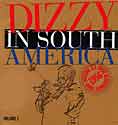 After
more than forty years on the shelf, these exceptional performances are
now available on two compact discs: Dizzy in South America
(Red Anchor, 2 volumes, CAP
933 & CAP 934.
313-849-2333). Some of these sides were available at one time on a bootleg
LP, but most of them are made public for the first time. The sound quality
is excellent and the band was in fine form. Dizzy was in particularly
good shape during this tour and soars above the band with some of his
finest solos of the period. This was a superb redaction of the band, fired
up by the forceful drumming of Charlie Persip, featuring some great soloists,
including Frank Rehak and Melba Liston on trombones, Phil Woods on alto
sax, and Benny Golson as well as Billy Mitchell on tenor. Mitchell was
prominently featured, and one is reminded again of the magnificence of
the "colossus of Detroit"he burns on the opening "Cool Breeze," and never
lets up. The arrangements by Ernie Wilkins, Quincy Jones (who also works
in the trumpet section), and Melba Liston, among others, are well known
from other recordings by this band, but these performances, with such
fine solos, are among the best by this short-lived band. Mitchell and
Gillespie knew how to fire up an audience and you can hear the reaction
in the background. No matter how many times one has heard "Manteca," it
is impossible not to be excited by the version on volume 1, complete with
all the familiar routines. On every number the leader demonstrates repeatedly
why many critics thought that he was at his best in front of a big band. After
more than forty years on the shelf, these exceptional performances are
now available on two compact discs: Dizzy in South America
(Red Anchor, 2 volumes, CAP
933 & CAP 934.
313-849-2333). Some of these sides were available at one time on a bootleg
LP, but most of them are made public for the first time. The sound quality
is excellent and the band was in fine form. Dizzy was in particularly
good shape during this tour and soars above the band with some of his
finest solos of the period. This was a superb redaction of the band, fired
up by the forceful drumming of Charlie Persip, featuring some great soloists,
including Frank Rehak and Melba Liston on trombones, Phil Woods on alto
sax, and Benny Golson as well as Billy Mitchell on tenor. Mitchell was
prominently featured, and one is reminded again of the magnificence of
the "colossus of Detroit"he burns on the opening "Cool Breeze," and never
lets up. The arrangements by Ernie Wilkins, Quincy Jones (who also works
in the trumpet section), and Melba Liston, among others, are well known
from other recordings by this band, but these performances, with such
fine solos, are among the best by this short-lived band. Mitchell and
Gillespie knew how to fire up an audience and you can hear the reaction
in the background. No matter how many times one has heard "Manteca," it
is impossible not to be excited by the version on volume 1, complete with
all the familiar routines. On every number the leader demonstrates repeatedly
why many critics thought that he was at his best in front of a big band.
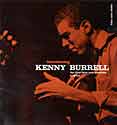 Those
interested in the Motor City jazz tradition might be interested in two
recent reissues. Introducing Kenny Burrell (Blue
Note 24561)
is a two-CD set that reproduces the first three LPs recorded for Blue
Note in 1956 by the guitarist. He is joined by other prominent Detroiters,
including Tommy Flanagan, Paul Chambers, Doug Watkins, and Louis Hayes. Those
interested in the Motor City jazz tradition might be interested in two
recent reissues. Introducing Kenny Burrell (Blue
Note 24561)
is a two-CD set that reproduces the first three LPs recorded for Blue
Note in 1956 by the guitarist. He is joined by other prominent Detroiters,
including Tommy Flanagan, Paul Chambers, Doug Watkins, and Louis Hayes.
From the same era comes Yusef Lateef: The Last Savoy Sessions (Savoy Jazz 92881-2),
with 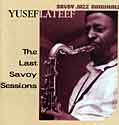 reissues
of about half of Lateef's classic recordings for the label. These are
exceptional recordings by any standards, and it is good to have them back
in circulation. Lateef's mighty tenor, flute and oboe are joined by Bernard
McKinney, euphonium, Terry Pollard and Hugh Lawson, piano, Bill Austin
and Ernie Farrow, bass, and Frank Gant and Oliver Jackson, drums. It is
particularly gratifying to be reminded again of the fine piano playing
of Terry Pollard. Herb Boyd provides some excellent liner notes. reissues
of about half of Lateef's classic recordings for the label. These are
exceptional recordings by any standards, and it is good to have them back
in circulation. Lateef's mighty tenor, flute and oboe are joined by Bernard
McKinney, euphonium, Terry Pollard and Hugh Lawson, piano, Bill Austin
and Ernie Farrow, bass, and Frank Gant and Oliver Jackson, drums. It is
particularly gratifying to be reminded again of the fine piano playing
of Terry Pollard. Herb Boyd provides some excellent liner notes.
I N - T H I S - I S S U E :
1. FESTIVAL LINE-UPS---2.
JAZZ FESTIVAL DIRECTOR
3. KURT ELLING---4.
RECENT RECORDINGS
5. SEMJA CLINICIANS---6.
DETROIT FEST SCHEDULE
HOME
|
|

